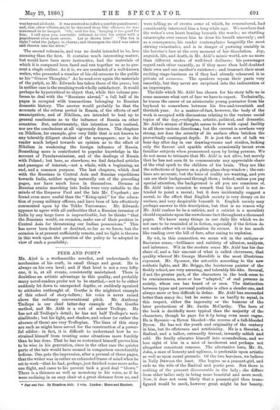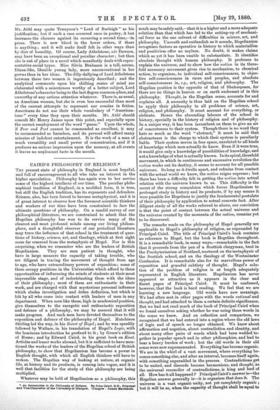PEER AND POET.*
MIL Alni; is a workmanlike novelist, and understands the mechanism of his craft, in small things and great. He is always on his own level; and if that level is not a very lofty one, it is, at all events, consistently maintained. There is doubtless an artistic advantage in this quality, and probably many novel-readers prefer not to be startled,—not to be either suddenly let down to unexpected depths, or suddenly upraised to attitudes unthought of. Goethe is the mightiest example of this school of story-tellers ; his voice is never raised above the ordinary conversational pitch. Mr. Anthony Trollope is our chief latter-day example of the Goethe method, and Mr. Aide is a sort of minor Trollope. He has not all Trollope's detail; he has not half Trollope's veri- similitude; but his light, and shadow, and colour (or rather the absence of them) are very Trollopiau. The lines of this story are such as might have served for the construction of a power- ful edifice: in fact, it is difficult to understand how he re- strained himself from treating some situations more forcibly than he has done. That he has so restrained himself proves him to be wise in his generation, since in the other case the quieter parts of the tale would have seemed in comparison unendurably tedious. One gets the impression, after a perusal of these pages, that the writer was in rather an exhausted frame of mind when he set to work—that he had, perhaps, just finished some more ardu- ous flight, and came to his present task a good deal "blown." There is a thinness as well as monotony in his voice, as if he were reclining in an easy chair at a great distance from us, and * Peer and Pod. By Hamilton Aide. a yob. London : Harm and Blacken.
were telling us of events some of which, he remembered, bad considerably interested him a long while ago. We nowhere find
the writer's own heart beating beneath the words ; no startling catastrophe ever causes him to draw his breath unevenly ; and as a consequence, his reader contemplates languidly the most stirring vicissitudes, and is in danger of yawning amiably in the heroine's face at the very moment of her dissolution. Joy, anguish, life, and death, in Mr. Aide's mimic world, are no more than different modes of well-bred dullness; his personages regard each other vacantly, as if they more than half-doubted their own and one another's existence ; and transact their most exciting stage-business as if they had already rehearsed it in private ad nauseam. The speakers repeat their parts very smoothly, but they never are surprised into the indiscretion of an impromptu.
The title which Mr. Aide has chosen for his story tells us in some measure what sort of fare we have to expect. Technically, he traces the career of an aristocratic young poetaster from his boyhood to somewhere between his five-and-twentieth and thirtieth year. As a matter-of-fact, however, the body of the work is occupied with discussions relating to the various social topics of the day,—religious, artistic, political, and domestic. Mr. Aide's stream of thought seems to flow with equal facility in all these various directions; but the current is nowhere very strong, nor does the serenity of its surface often betoken the proverbially contingent depth. It is just the sort of talk we hear day after day in our drawing-rooms and studios, lacking only the flavour and sparkle which occasionally invest even familiar subjects when pronounced upon by living persons. We do not mean to intimate that Mr. Aide is not alive, but merely that he has not seen fit to communicate any appreciable share of the vital spark to the children of his brain. They are like the reflections of figures on a plate-glass shop-window ; the out- lines are accurate, but the hues of reality are wanting, and you can see their background through them ; indeed, unless you pay special attention, the background is all you are conscious of.
Mr. Aide takes occasion to remark that his novel is not in- tended to point a moral ; but it does incidentally suggest a moral, to the effect that English society is very dreary on its surface, and very despicable beneath it. English society may perhaps answer to this description, but that is no reason why Mr. Aide (unless he be a satirist, and a satirist is a moralist) should expatiate upon the unwelcome fact throughout a thousand pages. We know many things in our daily life which we do. not care to be reminded of in fiction, especially if the fiction do not make either wit or indignation its excuse. It is too much like reading over the bill of fare, after eating to repletion.
By wit, in this connection, we mean wit in the antique or Baconian sense,—brilliance and subtlety of allusion, analysis, and inference. Wit in the modern sense Mr. Aide has his due share of, and a fair amount of what is called cleverness, that quality whereof Mr. George Meredith is the most illustrious exponent. Mr. Spooner, the art-critic according to the new resthetic lights, and Mr. Briggs, the boisterous painter of the fleshly school, are very amusing, and tolerably life-like. Several, if not the greater part, of the characters in the book seem to be reminiscences, more or less "adapted," of real persons in society, whom one has heard of or seen. The distinction between types and personal portraits is often a slender one, and always more or less difficult to define. Mr. Aide has succeeded better than many do ; but he seems to us hardly to equal, in this respect, either the ingenuity or the humour of the later productions of Mr. Justin McCarthy. The hero of the book is decidedly more typical than the majority of the characters, though he pays for it by being even more vague. He is Byronic—a Byron blooded—the reverse of a full-blooded Byron. He has not the youth and originality of the century in him, but its effeteness and artificiality. He is a theorist, a Radical, and a talker, outwardly fervent, inwardly selfish and cold. He finally educates himself into scoundrelism, and, we lose sight of him in a mist of incoherent and perhaps not altogether consistent remorse. The alternative hero, Mr. St. John, a man of honesty and ugliness, is preferable upon artistic as well as upon moral grounds. Of the two heroines, we believe in Nelly Dawson the least. She begins as a. peasant-girl, and ends as the wife of the Radical and poetic peer. But there is nothing of the peasant discoverable in the lady ; she differs from other ladies only in being more beautiful and more meek. Now, it does not seem likely that a peasant-girl thus trans- figured would be meek, however great might be her beauty. Mr. Aide may quote Tennyson's "Lord of Burleigh " as his justification; but if such a case occurred once in poetry, it but increases the chances against its occurring a second time,—in prose. There is new blood in the lower orders, if there is anything ; and it will make itself felt in other ways than by dint of humility. Of course, Lady Athelstone, nee Dawson, may have been an exceptional and peculiar character ; but then she is out of place in a novel which manifestly deals with repre- sentative social types. Miss Silvia Brabazon is a tall, serene, Diana-like, likeable young lady, more unconventional in her gowns than in her ideas. The dilly-dallying of Lord Athelstone between these two women is ingeniously described ; and the analytical comments upon his shifting states of mind are elaborated with a minuteness worthy of a better subject, Lord Athelstone's character being to the last degree common-place, and unworthy of any serious attention whatever. There is, as usual, an American woman, but she is even less successful than most of the current attempts to represent our cousins in fiction. Americans do not use their whole vocabulary of " American- isms " every time they open their mouths. Mr. Aide should consult Mr. Henry James upon this point, and especially upon the correct employment of the word "guess." Upon the whole, if Peer and Poet cannot be commended as excellent, it may be recommended as harmless, and its perusal will afford many minutes of indolent entertainment. It is the work of a man of much versatility and small power of concentration, and if it produces no serious impression upon the memory, at all events it leaves no unpleasant taste in the mouth.



































 Previous page
Previous page